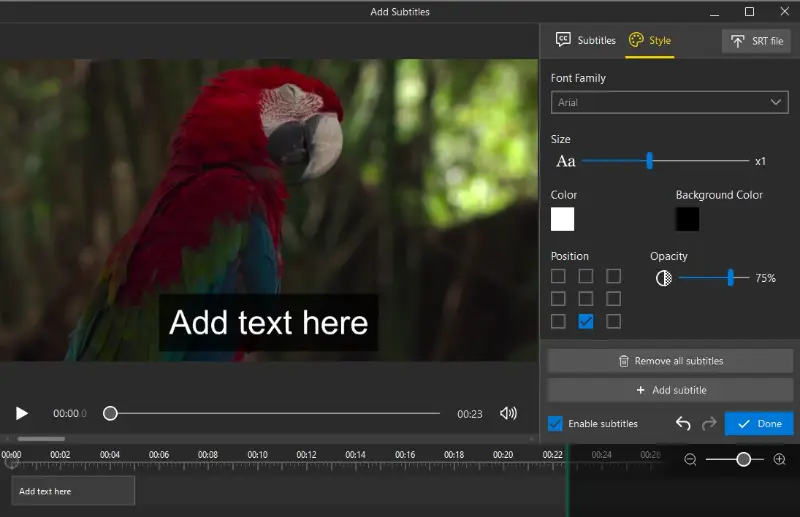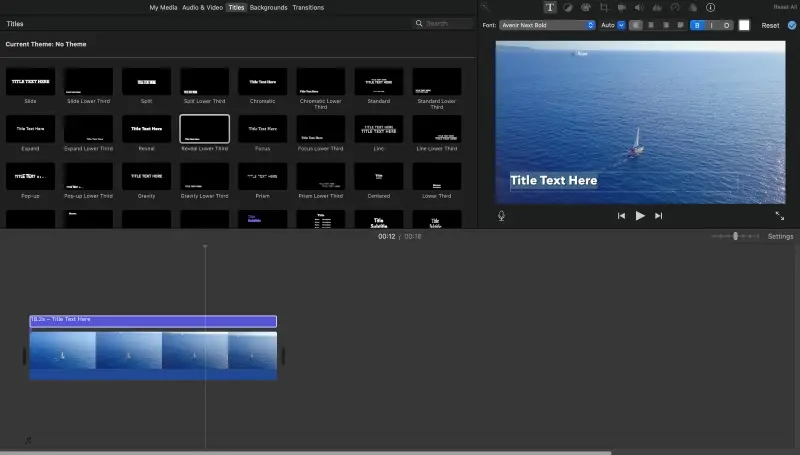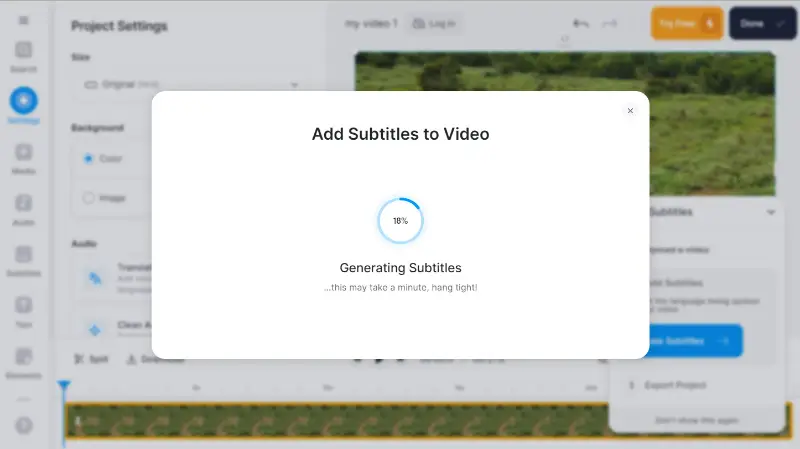5 Simple Ways to Add Subtitles to a Video
Catering to the diverse needs of today's audience requires more than just compelling visuals and engaging narratives. Knowing how to add subtitles to a video is essential for reaching broader audiences, including those with hearing impairments and non-native language speakers.
Adding subtitles may sound daunting to beginners, but fear not! In this comprehensive guide, we'll walk you through 5 straightforward video editing software and online services to seamlessly integrate subtitles into your projects.
What is a subtitle?
Subtitles are the text that provides a transcription or translation of the dialogue or narration in a video, film, television show, or other visual media.
They are typically displayed at the bottom of the screen, allowing viewers to read along while watching. They are often used in online streaming services, where users can choose from a list of languages to enhance their viewing experience.
SRT (SubRip Subtitle) is a plain text file format commonly used for storing subtitles or captions alongside video content. SRT files contain information about the timing and content of subtitles, allowing them to be synchronized with specific moments in a video.
Subtitle types
| Type | Description |
|---|---|
| Burned-In | Subtitles that are integrated into the video file, not toggled on/off. |
| Soft | Subtitles that can be turned on or off and are stored in a separate file. |
| SDH | Similar to closed captions but includes additional audio cues. |
| Transcripts | A written record of everything said in the video, often provided separately. |
| Foreign Language Subtitles | Translations of the original audio to a different language. |
| Karaoke Subtitles | Timed text that highlights lyrics word-by-word or line-by-line. |
Option 1: For Windows
Icecream Video Editor is a user-friendly free video editing software designed to simplify the editing process for users of all skill levels. It offers a range of features to trim, cut, merge, create subtitles, add audio, etc.
How to add subtitles to a video in Icecream Video Editor
- Download free video editor for PC from the official website and install it on your computer.
- Press the "Add files" button, choose the desired video, and drag and drop it to the timeline.
- Go to the "Subtitles" tab. You will have 2 options for adding text:
- Automatic. Click "SRT file" in the upper right corner and import your document containing subtitles.
- Manual. Press the "Add subtitle" button. Set the desired beginning and end time and input text. Repeat for each caption.
- Use the "Style" tab to change font, size, etc. Hit the "Play" button to preview the subtitles and make any necessary adjustments.
- When you are satisfied, click "Export video" to save the result.

Pros:
- Timing control. Users can precisely control the timing of subtitles, ensuring accurate synchronization with the video.
- Customization options. You have full control over how your subtitles look with options to change font, size, color, and position.
- Live preview. The subtitle creator allows you to see how your captions will look in the final video before exporting it.
- Time-saving. Adding subtitles manually can be a time-consuming task, but this program streamlines the process, allowing you to import an SRT file.
- Editing features. The free video editor offers a range of editing tools, such as video trimming, cutting, and splitting, allowing users to make simple changes to their videos.
Ultimately, Icecream Video Editor presents itself as a user-friendly and versatile video editing software for adding subtitles to videos, along with a range of basic and intermediate editing features.
Option 2: For macOS
iMovie is a video editing software developed by Apple. It is available exclusively for macOS and iOS and is designed to be intuitive, making it accessible to beginners and casual users who want to edit videos quickly and easily.
How to put subtitles on any video in iMovie
- Open iMovie, create a new project, and import the desired video.
- To add subtitles, click the "Titles" option in the toolbar.
- Select the style of subtitle you want to use and double-click to add it.
- Press the "T" icon above the preview to enter the text into the title box.
- Adjust the duration and position of the title clip in the timeline to sync with the corresponding audio or video.

Pros:
- Accessibility. The free video editing software comes pre-installed on macOS and iOS devices, making it readily available to users without the need for additional downloads or purchases.
- Customization options. Users can customize the appearance of titles, like font, size, color, and animation effects, to create visually appealing results.
- Sync with iCloud. The free video editor automatically syncs projects to iCloud, allowing users to access and continue editing their videos from different devices.
- Built-in templates. It includes pre-made styles, transitions, and effects that simplify the process and help maintain a polished look.
Cons:
- No subtitle import. The video editor does not support importing external files, requiring users to manually create subtitles within the application.
To conclude, adding subtitles to a video through iMovie is a seamless and efficient process. It offers a range of customization options and is suitable for most basic subtitling needs.
Option 3: Cross-platform
VLC is a free and open-source multimedia player. In addition to its ability to play media, it allows users to convert their files, put subtitles on a video, and more.
How to add captions to your video in VLC
- Install and open VLC Media Player and click "Media" in the menu bar.
- Select "Open File" and browse the video in which you desire to include subtitles.
- Once the video is playing, hit "Subtitles" in the top menu.
- Choose "Add Subtitle File" and import the file you wish to utilize.
- The subtitle should now appear on the video. If it doesn't, click "Subtitle Track" in the "Subtitles" menu and choose the file again.

Pros:
- Compatibility. The video software supports a vast array of video and subtitle formats, ensuring compatibility with most media files.
- Track selection. Users can add multiple subtitle tracks to one video and easily switch between them if necessary.
- Platform support. The media player is available for various operating systems, including Windows, macOS, Linux, Android, and iOS.
- Open-source. It is free to download and use, with no hidden costs or subscription fees, and allows for community contributions and improvements.
Cons:
- No customization. The subtitle creator doesn't have any customization options for captions. This means you can't change the font size, color, or position of the text.
- No editing. Any changes would require re-uploading a new subtitle file.
In summary, adding subtitles through VLC is a convenient and effective method to improve your videos. However, it may not be the best option for those looking to create subtitles from scratch or make any edits to the existing ones.
Option 4: Mobile
CapCut is a free video editing app for Android and iOS, offering simple tools to style subtitles directly from your phone.
How to add subtitles to a video on mobile in CapCut
- Open CapCut, tap "New Project", and select your clip.
- Hit "Text" at the bottom, then "Add Text" to insert your subtitle.
- Type the content, tap the checkmark, and drag the layer to adjust timing.
- Customize the font, color, size, and animation as needed.
- When finished, use the "Export" icon to save or share the result.

Pros:
- Free and offline. No account or internet connection is required.
- Text animation. Includes animated presets to enhance subtitles.
- Style options. Customize fonts, colors, backgrounds, and alignment.
Cons:
- No auto-subtitles. Captions must be typed manually.
- Small screen limits. Detailed timing may be harder to fine-tune.
In summary, CapCut offers a fast, mobile-friendly way to add subtitles to a video without needing internet or advanced skills.
Option 5: Online
VEED.io is an online video editing platform that allows users to work on their videos quickly and easily directly in their web browser. It offers various features, including adding subtitles, text, images, and audio.
How to add subtitles to a video online on VEED.io
- Go to the VEED.io website and upload the desired file to the video editor.
- The service will allow you to automatically create subtitles. You can confirm it or create your own later.
- Click the "Subtitles" tab in the toolbar on the left side of the screen.
- You'll see options to add subtitles manually or import subtitle files.
- Once you've created or imported the titles, you can customize their appearance, timing, and position.
- After you're satisfied with the result, hit "Done" in the top right corner of the editor to save your video.

Pros:
- No installation required. As a web-based service, this subtitle creator does not require users to download any programs, allowing for convenient, accessible, and simple video editing.
- Subtitle import. The platform supports importing subtitle files (such as SRT), making it easy to add existing subtitles to your videos.
- Auto subtitles. The online video editor offers an auto subtitles feature, which automatically generates captions for your videos using advanced speech recognition technology.
- Customization. You can set various parameters for subtitles, including font, size, color, alignment, background, and more. This allows you to personalize the text to match the video's style.
Cons:
- Watermark. The free version of video editor includes a brand watermark on exported videos, which can be removed by upgrading to a paid plan.
- File size. Users without a premium subscription can upload only 1 GB of video on the platform, which could restrict those with large files.
In summary, including text overlays on a video using VEED.io streamlines and maximizes efficiency for content creators. With its user-friendly interface and customization options, the service makes adding subtitles accessible to everyone.
Closed captions vs subtitles
The terms "closed captions" and "subtitles" are often used interchangeably but they cater to different needs.
What are closed captions?
Closed captions provide a text-based representation of dialogue, sound effects, and other relevant audio elements within a video.
They are particularly useful for individuals who are deaf or hard of hearing.
| Aspect | Subtitles | Closed Captions |
|---|---|---|
| Content | Written representation of the narration in a video. | Dialogue, sound effects, and other audio elements. |
| Purpose | Providing translated text for viewers who do not understand the original language. | Designed for viewers who are hard of hearing, as well as situations where audio cannot be heard or understood clearly. |
| Interaction | Typically displayed by default, although some platforms offer the option to enable or disable subtitles. | Can be toggled on or off by the viewer. |
| Usage scenarios | Widespread use in international film and television distribution, online streaming services, and digital media platforms. | Mandated by law in many countries for certain types of programming. |
As you can see, while closed captions and subtitles share similarities in providing text-based information during video playback, they serve distinct purposes.
FAQ about subtitle creators
- How accurate are automatic subtitle makers?
- They can provide a decent starting point but often require manual editing for accuracy, especially with complex dialogue or technical terminology.
- Can I add subtitles to a video after it has been published?
- In many cases, yes. Depending on the platform, you may be able to upload a subtitle file to the video editor or use built-in tools to import subtitles to existing videos.
- Are there specific font styles and sizes recommended for subtitles?
- It's best to use clear, easy-to-read fonts with appropriate sizes and contrast to ensure readability across different devices and viewing conditions.
- What file formats should I use for subtitles?
- Common subtitle file formats include SRT (SubRip), VTT (WebVTT), and ASS/SSA (Advanced SubStation Alpha). These formats are widely compatible with various video platforms and players.
Add subtitles to a video: Conclusion
As you can see, adding subtitles to your videos can significantly enhance their accessibility and reach, making them more inclusive and engaging for diverse audiences.
In this article, we've explored four simple ways to create subtitles for a video. Each of these free video editors offers its own advantages and may be suitable depending on your specific needs, preferences, and technical proficiency.


